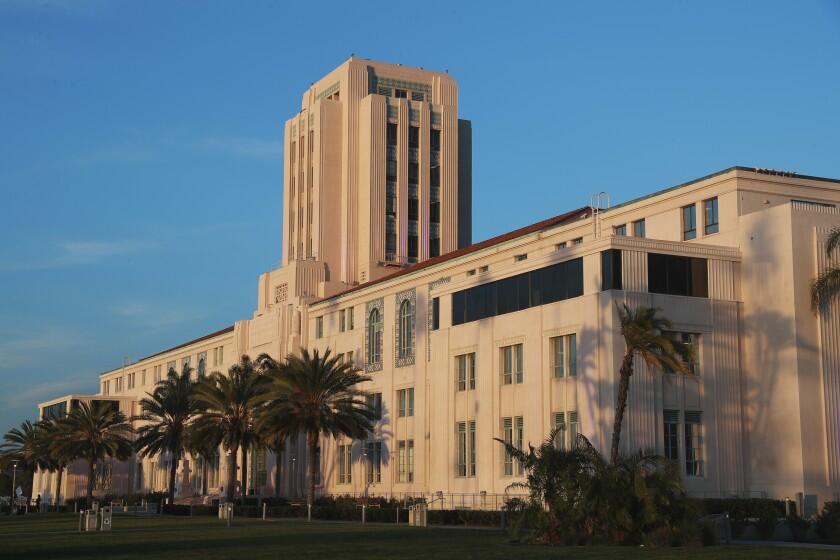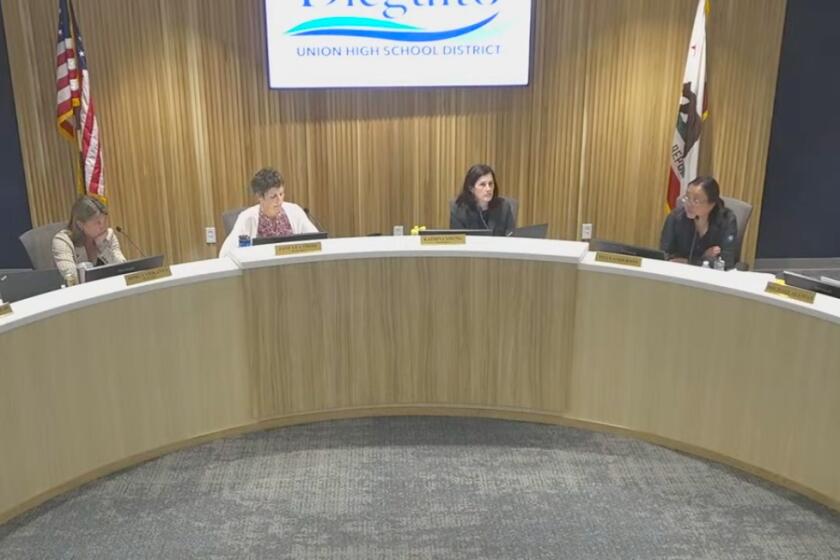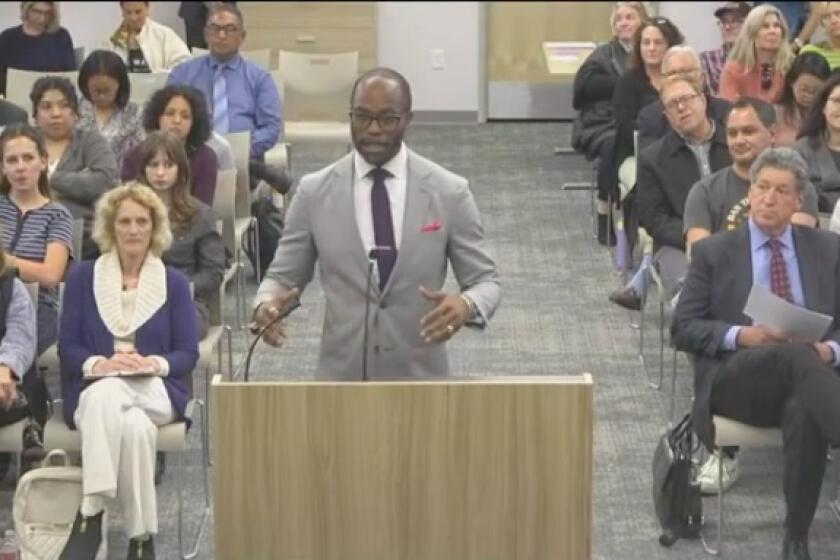John Cox: Can he chart a path from Rancho Santa Fe to the governor’s mansion?

Unless they are transplanted Chicagoans, few Californians know about Jays potato chips.
That’s about to change.The Windy City snack plays a crisp, upbeat part in the biography of John Cox, the Rancho Santa Fe Republican who finished second in the June 5 primary for California governor.
In 1994, the chips were down for Jays. Six years earlier, the founding Japp family had sold the company to the Borden corporation. With sales of chips, popcorn and other goodies turning stale, Borden announced it was set to bail.
That’s when Cox, an Illinois native, helped the family reacquire the company, saving it from bankruptcy and possible relocation.
“There were other snack companies interested in this business,” Cox told the Chicago Tribune in 1994, “and they could have moved the jobs here to their plants.”
While only a temporary reprieve — Jays closed for good in 2007, after Cox had moved on — this episode echoes his campaign themes of fiscal responsibility and free enterprise. Cox will face June 5 primary winner Lt. Gov. Gavin Newsom, a Democrat, in November.
“This means something to Californians who are struggling with the highest taxes in the country,” Cox said during one of his many TV interviews Wednesday morning, June 6.
“This election will set up a clear choice between Venezuela, which is what Gavin Newsom wants California to look like, and the California Dream restored, which is what I am aiming to do.”
Both Cox and Newsom need to quickly define themselves and their campaigns, veteran political observers say, or their opponent will portray them in the ugliest possible light. Newsom, thanks to his two terms as San Francisco mayor and then two terms as lieutenant governor, has spent decades honing his political image.
Not so for Cox. At the Republicans’ election-night party in San Diego’s U.S. Grant Hotel, it was not uncommon to find party faithful who were unfamiliar with their standard bearer. And his endorsement by President Donald Trump could be more hindrance than help in California, where polls routinely show most voters disapprove of the White House’s current occupant.
“Running for governor of California by embracing Trump is like telling the Rebel Alliance: ‘Vote for me. I'm with Darth Vader!’” said John Pitney Jr., professor of American politics at Claremont McKenna College.
“Pretty quickly, Newsom is going to define Cox as a Trump clone. To continue the ‘Star Wars’ analogy, it’ll be the, ‘Attack of the Clones.’”
Cleaning the barn
Cox, 62, pushes back against any criticisms of his White House ties.
“Donald Trump didn’t create our housing crisis,” he told one interviewer, “Donald Trump didn’t make our schools 45th in the nation, Donald Trump didn’t destroy the California water project by tearing down reservoirs, Donald Trump didn’t make us the poverty capital and the homeless capital of the country and the laughingstock of the country with businesses and people wanting to move out.
“Gavin Newsom wants to blame Donald Trump? He ought to look in the mirror, because the people of this state know who is responsible for the quality of life here.”
Cox, a self-proclaimed “Californian by choice,” was born on Chicago's South Side. Raised by a single mother and later a stepfather, Cox grew up poor but with a strong work ethic.
“He wasn’t handed anything,” said Tim Van Damm, a real estate agent who met Cox at the Church of the Nativity, the Catholic parish in Rancho Santa Fe where both men worship. “He went to law school at night because he had to work to support himself.”
After an undergraduate education at the University of Illinois, he completed his studies at the Chicago-Kent College of Law and began his legal career at Coopers & Lybrand. Less than two year later, he founded his own law firm in Chicago, John H. Cox and Associates.
He became active with various charities and nonprofits — today, he’s on the board of the USO San Diego — and Republican politics. He ran for a series of offices: the House of Representatives (2000), the U.S. Senate (2002), the Cook County Recorder of Deeds (2004) and the presidency (2008).
While Cox lost every race, he didn’t lose his enthusiasm for politics. Since relocating to San Diego County in 2011, he tried to qualify two initiatives for the statewide ballot. Neither effort succeeded.
In 2017, he announced his candidacy for governor. Few pundits gave him much of a chance, many predicting that the November election would pit Democrat Newsom against Democrat Antonio Villaraigosa, a former Los Angeles mayor and state assembly speaker.
They misread the mood of the electorate, Cox said.
“All around the world,” he told Fox News the morning after the primary, “people are rising up against corruption in government. … I’m going to clean out the barn in Sacramento.”
San Diego Mayor Kevin Faulconer likes Cox’s chances. “It’ll be change vs. the status quo,” said Faulconer, a Republican. “And we need a lot of change.”
And while a Republican hasn’t won statewide office in California for 12 years, Tony Krvaric predicted that could soon change.
“The Democrats in November will be for sanctuary states and the gas tax,” said Krvaric, chair of the Republican Party of San Diego County. “The Republican position will be just the opposite. That will be a clear line between the two parties.”
Others, though, wonder if Cox is the right candidate for this race. Morgan Murtaugh, the Republican running against Rep. Susan Davis, D-San Diego, in the 53rd Congressional District, had backed Cox’s main Republican rival, Travis Allen.
“He shakes things up a little more,” Murtaugh said of Allen, “he’s not the traditional Republican candidate and I think, in a state like California, that’s what you need. I think John Cox will run a very traditional Republican campaign. I hope he doesn’t.”
And while a measure repealing the 2017 gas tax increase will be on November’s ballot, Pitney believes this will be of limited benefit to Cox.
“It might help some of the Republicans running for down-ballot offices,” the professor said, “but it’s not nearly enough to elect Cox.”
Especially when Newsom begins this election cycle with more than five times as much as the $6.5 million Cox has raised for his campaign — most of that coming from Cox’s own savings.
“He’s wealthy, but he’s not Meg Whitman wealthy,” Pitney said of the Silicon Valley billionaire who was the Republican’s losing gubernatorial candidate in 2010. “He can run a lavish campaign for state Assembly, but he just doesn’t have the means to run a lavish campaign for governor.”
Cox’s chance in November?
“If he breaks 40 percent,” Pitney said, “he can claim a moral victory.”
Shifting views
Others aren’t so quick to write off Cox. Tom Shepard, a longtime San Diego political consultant, has worked on campaigns for both Republicans and Democrats and noted that there will be no perfect candidates on the November ballot.
“Gavin Newsom has shown himself to be a charismatic and attractive candidate,” Shepard said, “but he has also shown himself to be a high-risk candidate. He’s had a tendency to make statements that are not well thought out.”
Shepard, who is not working on either gubernatorial campaign, agreed with Cox’s supporters that the gas tax and, to a lesser degree, “sanctuary city” issues work against California Democrats. And yet…
“He has his own vulnerabilities,” Shepard said of Cox. “He’s taken some interesting positions in the past and they have not been as thoroughly investigated as they will be in this election.”
This year, Cox went from opposing a border wall to becoming a supporter of Trump’s project. He recently took some heat for 2007 statements that seemed to link homosexuality to bestiality and polygamy; he said he’s changed his views. In March 2017, he discouraged the San Francisco Chronicle from comparing him to the man who is now his most prominent supporter.
“I know my opponents will try to tie me to Mr. Trump. I am not Mr. Trump,” he said. “I’m analytical, I’m policy-oriented. I read five newspapers a day. I’m not a reality TV star that’s going to insult people. I’m going to try to rally people.”
That rally now begins in earnest. From the sidelines, Shepard is eager to see how this race plays out between now and Nov. 6.
“Politics is a strange business,” he said. “Over a period of four months, lots of things can happen.”
--Peter Rowe is a reporter for The San Diego Union-Tribune
Get the RSF Review weekly in your inbox
Latest news from Rancho Santa Fe every Thursday for free
You may occasionally receive promotional content from the Rancho Santa Fe Review.





